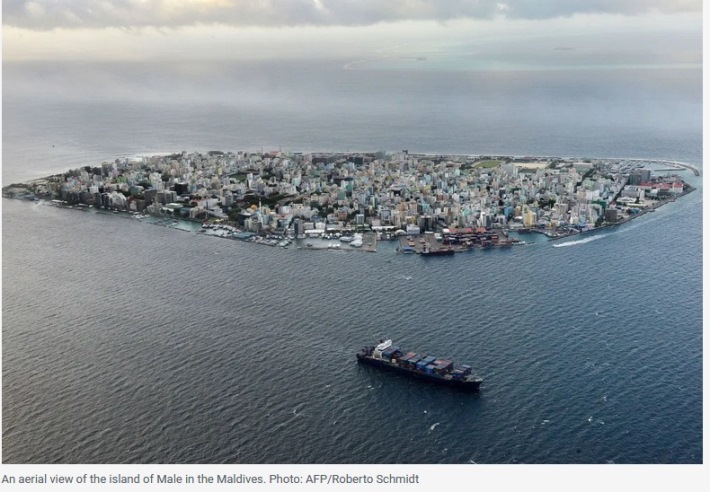Covid-19 sows Islamic trouble in Maldives paradise
From Asia Times MALE – As tourism in Maldives plummets with the travel-restricting Covid-19 pandemic, forcing many in the globally-oriented industry into unemployment, the idyllic island nation could soon become more vulnerable than ever to extremist groups like the Islamic State.
That rising risk was apparent on February 4, when three foreigners were stabbed on the outskirts of Male, the island nation’s capital. Muslim militants later took responsibility for the attacks, the first seen in years.
After the 2004 (Indian Ocean earthquake and tsunami) natural disaster, Maldives saw a massive and opportunistic influx of funds from Saudi Arabia, much of which went to pay extremist Wahhabi imams and build new mosques on even the most remote atolls in the wide-reaching Indian Ocean archipelago.
The radicalization that followed drove an estimated 200 young men to Syria and Iraq to fight alongside ISIS. “Most of them had a background in the Maldivian military,” former president Mohamed Nasheed said
The country has the potential to become a hotbed of radical Muslim extremism. Maldives is a 100% Sunni Muslim country, and, according to Article 9D of the country’s 2008 constitution, “a non-Muslim may not become a citizen of the Maldives.”
The charter’s Article 10, meanwhile, states that “Islam shall be basis of all the laws” and “no law contrary to any tenet of Islam shall be enacted.”
As such, Maldives mixes elements of Islamic sharia law and English common law, the latter of which was introduced when the islands were a lightly administered British protectorate from 1887 to 1965.
…radical tensions are bubbling under the surface. The first extremist shock came in September 2007, when a homemade bomb was detonated in a park near Male’s Islamic Center, injuring two British, two Japanese and eight Chinese tourists.
Two of the 12 detained suspects were Bangladeshis who had been radicalized by so-called “charities” connected to Lashkar-e-Toiba, a Pakistani outfit that used tsunami relief missions in Maldives as cover to recruit potential jihadists, intelligence sources say.
Then, in February 2012, almost all the pre-Islamic artifacts at the Maldives’ National Museum, dating back to the period before the 12th century when the islands were predominantly Buddhist, were destroyed in an attack by local Islamic extremists. Among the destroyed priceless items was a six-faced coral statue of religious significance, a 46-centimeter high bust of the Buddha, and other limestone and coral statues.
At the time, Maldivian officials said the radicals destroyed the figures because they considered them to be “idols” and therefore illegal under Islamic and national laws. Ali Waheed, the museum’s director, was quoted in a New York Times article at the time as saying that “the collection was totally, totally smashed. The whole pre-Islamic history is gone.”
The two Bangladeshis in the 2007 bombing highlighted another problem that has grown over the years.
Due to local Islamic constraints and customs, few Maldivians work in the country’s many high-end resorts, nearly all of which are located on tiny islands without any local indigenous populations. They tend to be managed by Westerners and staffed mainly by tens of thousands of poorly paid Bangladeshis. Minister Ahmed Naseem estimates that the number of Bangladeshis working legally and illegally in Maldives at 86,000, a vast number of migrants proportionately considering the nation’s population is only 400,000.
What will happen to those Bangladeshis who become unemployed with the tourism sector’s collapse is unclear, but officials fear they could become recruits for radicalization, together with groups of young Maldivian Muslims.
If the current Covid-19 crisis deepens, new social problems will inevitably follow, particularly in the capital Male, one of the most densely populated urban centers in the world.
 As ex-president Nasheed pointed out, radicalization is not confined to disgruntled youths: “Radical Islam is getting very, very strong in Maldives. Their strength in the military and in the police is very significant. They have people in strategic positions within both.”
As ex-president Nasheed pointed out, radicalization is not confined to disgruntled youths: “Radical Islam is getting very, very strong in Maldives. Their strength in the military and in the police is very significant. They have people in strategic positions within both.”
As elsewhere, the island country is now in an economy-strangling lockdown, one that will contribute to the desperation and frustration of many young Maldivians and unemployed migrants. As they inevitably seek comfort and refuge in religious beliefs, fears are rising they will be easy prey to hardline imams and extremist groups looking for new young recruits to their radical causes.
I thought the Maldives was supposed to be underwater by now? Apparently not.